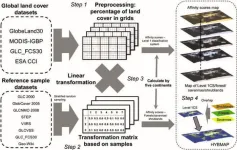(Press-News.org) Researchers at the University of California San Diego School of Global Policy and Strategy have developed a new method to predict the financial impacts climate change will have on agriculture, which can help support food security and financial stability for countries increasingly prone to climate catastrophes.
The study, published today in the Proceedings of the National Academy of Sciences, uses climate and agricultural data from Brazil. It finds that climate change has a cascading effect on farming, leading to increased loan defaults for one of the nation’s largest public sector banks. Over the next three decades, climate-driven loan defaults could increase by up to 7%, according to the study.
The projections in the paper revealed that although temperatures are rising everywhere, there is substantial variation in what that looks like from region to region, which underscores the need to build distinct types of physical and financial resilience.
For example, parts of northern Brazil are predicted to have more dramatic seasonal swings around 2050, with heavier rainfall in winter and drier summers, so policymakers should be thinking about the need for water storage by building dams and reservoirs as well as increasing groundwater storage capacity. Conversely, central Brazil may have fairly steady weather, but will have higher overall temperatures, pointing to a need for heat-resistant crops.
The authors of the paper used a statistical approach pairing past climate data in Brazil with information on crop productivity, farm revenue and agricultural loan performance. They combined this data with climate simulations to predict future weather conditions and their impacts on farming and how those changes will affect financial institutions.
“A difficulty in studying climate impacts on agriculture is that there are all sorts of adaptations happening all the time that aren’t easily observed, but are really important for understanding vulnerability and how risk is changing,” said coauthor Jennifer Burney, professor of environmental science at UC San Diego’s School of Global Policy and Strategy and Scripps Institution of Oceanography. “We were able to distinguish signals from different types of climate impacts and which ones led to this larger financial risk.”
Systematic thinking about building resilience against climate change around the globe
A key objective of the research is to support resilient food security under a changing climate, which requires understanding of when small climate shifts might have outsized impacts, spilling across regions or into other sectors through institutions like trade and banking.
Understanding the systemic risk posed by climate change is especially helpful for policymakers and disaster relief agencies, as climate change has increasingly become a national security threat. To that end, the statistical approach developed in the study could be applied around the globe.
“The technique we developed will help populations identify where they are most vulnerable, how climate change will hurt them the most economically and what institutions they should focus on to build resilience,” said study coauthor Craig McIntosh, professor of economics at the School of Global Policy and Strategy.
For example, some governments in the Western Pacific region buy extra food on the global market in emerging El Niño years, when their own crop productivity suffers. The statistical approach used in the study could help governments around the world understand their own climate conditions and whether local, regional or international institutions will be best placed to address them.
The research could be especially helpful with the development of the loss and damage fund established by the United Nations in 2022. The fund is designed to help compensate developing nations that have contributed the least to the climate crisis but have been facing the brunt of its devastating floods, drought and sea-level rise.
“Our technique could help countries think about where the resilience returns would be highest for the money spent,” said Krislert Samphantharak, professor of economics at the School of Global Policy and Strategy. “This technique also helps to identify where international reinsurance might be needed.”
The “Empirical Modeling of Agricultural Climate Risk” study was also coauthored by Bruno Lopez-Videla, who earned a Ph.D. in economics from UC San Diego in 2021 and Alexandre Gori Maia of the Universidade Estadual de Campinas in Brazil.
END
How climate change will impact food production and financial institutions
Study from UC San Diego's School of Global Policy and Strategy finds Brazil is expected to suffer from severe weather, hurting crop yields and one of the country’s largest public sector banks
2024-04-08
ELSE PRESS RELEASES FROM THIS DATE:
MSU researchers find more action needed to prevent arthritis
2024-04-08
MSU has a satellite uplink/LTN TV studio and Comrex line for radio interviews upon request.
EAST LANSING, Mich. – The prevalence of early knee osteoarthritis (OA) symptoms faced by patients after anterior cruciate ligament (ACL) reconstruction is staggering — but not much is being done to address it according to new research published by scholars from Michigan State University’s Department of Kinesiology.
The study – published by the Journal of Athletic ...
Americans are bad at recognizing conspiracy theories when they believe they’re true
2024-04-08
Conspiracy theorists get a bad rap in popular culture, yet research has shown that most Americans believe conspiracy theories of some sort. Why then, if most of us believe conspiracies, do we generally think of conspiracy theorists as loony?
New research from the University of Illinois Chicago found that it’s because people are quite bad at identifying what is or isn’t a conspiracy theory when it’s something they believe. The finding held true whether people self-identified as being liberal ...
Skin pigmentation bias in pulse oximeters to get closer look
2024-04-08
By Beth Miller
Pulse oximeters send light through a clip attached to a finger to measure oxygen levels in the blood noninvasively. Although the technology has been used for decades — and was heavily used during the COVID-19 pandemic — there is increasing evidence that it has a major flaw: it may provide inaccurate readings in individuals with more melanin pigment in their skin. The problem is so pervasive that the U.S. Food & Drug Administration recently met to find new ways to better evaluate the accuracy and performance of the devices in patients with more pigmented skin.
Christine O’Brien, assistant professor of biomedical ...
Gendered recommendations in 19th century list of books for boys and girls set the stage for field of children’s literature today
2024-04-08
Children’s literature became a distinct category during the Progressive Era in the United States, largely through the work of professional “book women” like children’s librarians, publishers, and teachers. In a chapter in a new book, researchers examine one of the first attempts to formalize a selection of existing literature into a canon of children’s books, the 1882 pamphlet Books for the Young by Caroline M. Hewins. They also analyze the books selected by Hewins, with a focus on books designated for boys only and for girls only.
The ...
MU center projects a dip in farm income for springtime
2024-04-08
Another decline in net farm income is projected for the Show-Me State, according to the Spring 2024 Missouri Farm Income Outlook released by the University of Missouri’s Rural and Farm Finance Policy Analysis Center (RaFF).
The report offers a state-level glimpse at projected farm financial indicators, including farm receipts, production expenses and other components that affect net farm income. Projections from the report suggest that declining market receipts and lower crop prices play a role in the estimated $0.8 billion decrease in net farm income for 2024.
“Although decreased production expenses offer some relief, reduced livestock inventories ...
MIT engineers design soft and flexible “skeletons” for muscle-powered robots
2024-04-08
Our muscles are nature’s perfect actuators — devices that turn energy into motion. For their size, muscle fibers are more powerful and precise than most synthetic actuators. They can even heal from damage and grow stronger with exercise.
For these reasons, engineers are exploring ways to power robots with natural muscles. They’ve demonstrated a handful of “biohybrid” robots that use muscle-based actuators to power artificial skeletons that walk, swim, pump, and grip. But for every bot, there’s a very different build, and no general blueprint for how to get the most out of muscles ...
Your unsupportive partner is physically stressing you out
2024-04-08
BINGHAMTON, N.Y. -- Couples feel more understood and cared for when their partners show positive support skills – and it’s evidenced by levels of the stress hormone cortisol in the body – according to new research from Binghamton University, State University of New York.
A team of Binghamton University researchers including Professor of Psychology Richard Mattson conducted a study of 191 heterosexual married couples to find out if better communication skills while giving and receiving social support led to lower cortisol levels ...
Preventive angioplasty does not improve prognosis
2024-04-08
For heart attack patients, treating only the coronary artery that caused the infarction works just as well as preventive balloon dilation of the other coronary arteries, according to a new large study by researchers at Karolinska Institutet and others. The results are published in the New England Journal of Medicine.
Heart attack is a common disease with risks of serious complications. It has long been unclear what the best strategy is for treating narrowings in coronary arteries separate from the specific vessel that caused the infarction.
A new large Swedish study has investigated ...
Unveiling the world's skin: a map of global land cover from 2000-2020
2024-04-08
A new study introduces the Hybrid Global Annual 1-km International Geosphere-Biosphere Programme (IGBP) Land Cover Maps for the period 2000-2020. This innovative dataset, free to access, marks a significant step forward in global land cover mapping, addressing longstanding issues of disagreement and incompatible classification systems among existing land cover products.
Global land cover data, essential for environmental research, are plagued by inconsistencies across different datasets, complicating global change studies. The diversity in classification systems and methodologies challenges the creation of a unified, accurate land ...
Barbie may help physicians, patients have more productive telehealth visits
2024-04-08
As telehealth visits become more prevalent, physicians can sometimes struggle to help patients effectively demonstrate a musculoskeletal exam through a screen.
At the University of Michigan Health C.S. Mott Children's Hospital, one physician found a way to help pediatric patients demonstrate different joint movements using a Barbie doll.
While on telehealth appointments with patients, Alecia Daunter, M.D., an assistant professor of pediatric rehabilitation medicine at U-M Health, found that verbally ...
LAST 30 PRESS RELEASES:
Scientists discover why we know when to stop scratching an itch
A hidden reason inner ear cells die – and what it means for preventing hearing loss
Researchers discover how tuberculosis bacteria use a “stealth” mechanism to evade the immune system
New microscopy technique lets scientists see cells in unprecedented detail and color
Sometimes less is more: Scientists rethink how to pack medicine into tiny delivery capsules
Scientists build low-cost microscope to study living cells in zero gravity
The Biophysical Journal names Denis V. Titov the 2025 Paper of the Year-Early Career Investigator awardee
Scientists show how your body senses cold—and why menthol feels cool
Scientists deliver new molecule for getting DNA into cells
Study reveals insights about brain regions linked to OCD, informing potential treatments
Does ocean saltiness influence El Niño?
2026 Young Investigators: ONR celebrates new talent tackling warfighter challenges
Genetics help explain who gets the ‘telltale tingle’ from music, art and literature
Many Americans misunderstand medical aid in dying laws
Researchers publish landmark infectious disease study in ‘Science’
New NSF award supports innovative role-playing game approach to strengthening research security in academia
Kumar named to ACMA Emerging Leaders Program for 2026
AI language models could transform aquatic environmental risk assessment
New isotope tools reveal hidden pathways reshaping the global nitrogen cycle
Study reveals how antibiotic structure controls removal from water using biochar
Why chronic pain lasts longer in women: Immune cells offer clues
Toxic exposure creates epigenetic disease risk over 20 generations
More time spent on social media linked to steroid use intentions among boys and men
New study suggests a “kick it while it’s down” approach to cancer treatment could improve cure rates
Milken Institute, Ann Theodore Foundation launch new grant to support clinical trial for potential sarcoidosis treatment
New strategies boost effectiveness of CAR-NK therapy against cancer
Study: Adolescent cannabis use linked to doubling risk of psychotic and bipolar disorders
Invisible harms: drug-related deaths spike after hurricanes and tropical storms
Adolescent cannabis use and risk of psychotic, bipolar, depressive, and anxiety disorders
Anxiety, depression, and care barriers in adults with intellectual and developmental disabilities
[Press-News.org] How climate change will impact food production and financial institutionsStudy from UC San Diego's School of Global Policy and Strategy finds Brazil is expected to suffer from severe weather, hurting crop yields and one of the country’s largest public sector banks




